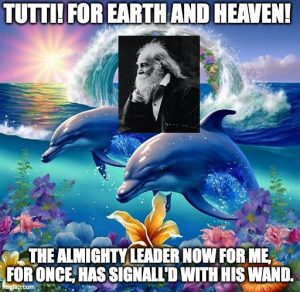Iconic American poet Walt Whitman embraces the “varied carols” of human life with the rapture of a rhapsode. His poetry is often characterized as democratic, composed in free verse. It shows an expansive all-embracing consciousness that loves everything in its multitudes.
I am sure I have some explaining to do here: a recent meme that has sprung up is kitschy images of dolphins on technicolor backgrounds, featuring incongruous text, and the catchy 2017 pop song “Symphony,” which was dredged up out of obscurity into this unlikely rebirth. The chorus goes “I just want to be part of your symphony,” in an ascending line that is intoxicating to sing. A “barbaric yawp” that I have certainly been sounding “over the rooftops of the world” lately.
But what ON EARTH could this incomprehensible meme have to do with Walt Whitman?
Whitman, as I recently found out, was an avid fan of the opera. His favorites included Gounod’s “Faust,” Meyerbeer’s “L’etoile du Nord,” Donetzeti’s “Lucia di Lamermoor,” and Bellini’s “La Sonnambula,” a mix of familiar and obscure works, and all quite kitschy. We must remember that Opera in the 19th century was pop culture, not high culture.
Whitman ends his poem with an image of waking up and discovering a rhythmus for his own poetry. (Proud Music of the Storm 15.20) This calls back earlier to a description of the final aria from “La Sonnambula,” a truly bizarre romantic comedy following a beautiful sleepwalker, Amina, through her romantic entanglements.
Awaking from her woes at last, retriev’d Amina sings;
Copious as stars, and glad as morning light, the torrents of her joy.
(Proud Music of the Storm 8.21-21)
The aria Whitman sings through poetry might sound something like this aria. I was amused by a detail reported by scholar Louise Pound: that Whitman didn’t really take to Wagner.
Whitman’s friends sometimes tried to interest him in Wagner, he tells us, thinking that the new music should be fundamentally congenial to him. “But I was fed and bred under the Italian dispensation,” he comments. “I absorbed it and probably show it
(Pound 61).
Wagner, with his insistence on dominating the audience with his works, was likely perhaps not democratic enough for Whitman.
In a 1924 paper about Whitman, Pound argues that opera is the artform that most profoundly influenced Whitman’s poetry. She says:
His thought and his technique sprang from attitudes of mind quite different from the customary. He was more than ordinarily self-made. He deliberately sought to free himself from older models and from accepted media of expression… Neverthelessless, any source that may throw light upon his poetical development, or upon the shaping of his individual poetical style, deserves taking into account—especially since, in these days, many are convinced that he looms largest of all our native poets
(Pound 58).
One of the central tenants of the Whitman mythos is his seemingly shocking originality. His poetry is a cry of freedom from the European poetic tradition, and the old fashioned New England elitism. Whitman is a man of the people, and of nature. He is quintessentially American. So what can we make of the influence of Opera, a European import, on his writing?
The answer seems to lie in one of his most extensive poems about music: “Proud Music of the Storm.” Whitman describes in dizzying succession images of the music of nature and man, referencing musical traditions from all over the world (Proud Music of the Storm 10). His approach is characteristically cosmopolitan. In an apostrophe he says:
Mighty maestros!
And you, sweet singers of old lands—Soprani! Tenori!
To you a new bard, carolling free in the west,
Obeisant, sends his love.
Such led me thee, O Soul!
(Proud Music of the Storm 13.5)
We see, through the close pairing of free and obeisant, that Whitman does not see himself as a break from tradition: rather, he is a new melodic line in a piece of music that encompasses the whole world, and the songs of its people.
If it is true that Whitman “looms the largest of our native poets,” the America he envisions in his poetry is the America he loved: it is essentially cosmopolitan, and its lines are not drawn on a map, but instead from one soul to another, like the filaments of a spider web (A Noiseless Patient Spider). It encompasses but does not subsume the various multitudes of human beings that make it up.
Works Cited:
Pound, Louise “Walt Whitman and Italian Musical.” The American Mercury 1925-09: Vol 6 Iss 21. Sunway Media, 1925. Internet Archive, http://archive.org/details/sim_american-mercury_1925-09_6_21.

